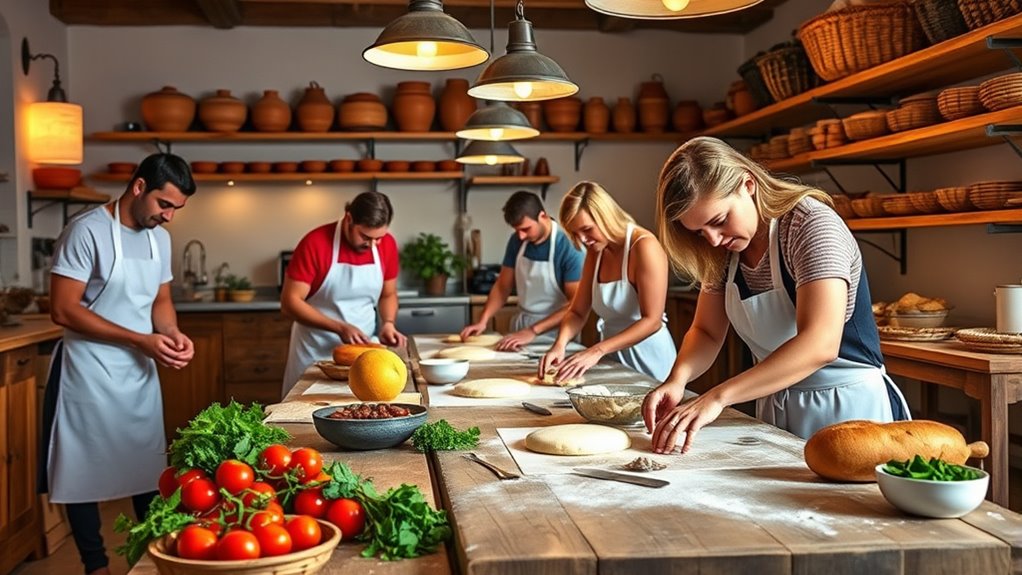At Ittiri’s culinary schools, you get hands-on experience in authentic Sardinian cooking, connecting deeply with local food traditions. You’ll learn regional specialties like Culurgiones, Pane Carasau, and seafood dishes, using traditional tools and methods. The programs often include farm visits and market explorations that reveal ingredient origins and sustainable practices. By participating in cultural excursions, you’ll gain a richer understanding of Ittiri’s culinary heritage—if you keep exploring, you’ll discover even more about this vibrant food culture.
Key Takeaways
- Ittiri’s culinary schools offer hands-on training in Sardinian traditional dishes like Culurgiones and Gallura’s gnocchi.
- Students learn authentic techniques using local ingredients and traditional tools such as mortar, pestle, and clay ovens.
- Programs include farm visits and market tours to explore ingredient sourcing and promote sustainability.
- Cultural excursions and community engagement deepen understanding of Sardinian food heritage and regional recipes.
- Graduates gain skills for careers in restaurants, catering, and food entrepreneurship, supporting regional culinary preservation.
Embracing Sardinian Culinary Heritage Through Hands-On Training

Embracing Sardinian culinary heritage through hands-on training allows you to connect deeply with the island’s rich food traditions. In Ittiri’s culinary schools, you actively participate in preparing iconic dishes like Gallura’s gnocchi, Culurgiones, and traditional ravioli, gaining insight into regional customs. Using fresh, locally sourced ingredients, you learn authentic techniques that preserve Sardinian culinary identity. Classes often take place in intimate settings like local homes or agriturismos, fostering genuine interactions with native hosts. You’ll not only master dough shaping, pasta filling, and unique closures but also understand the stories behind each recipe. Experience cultural and culinary insights through hands-on participation. Post-class communal meals deepen your appreciation, offering a social experience that highlights Sardinia’s hospitality and culinary pride. This immersive approach keeps the island’s food traditions alive for future generations and enhances your understanding of regional culinary techniques.
Exploring Regional Specializations and Unique Techniques

In Ittiri’s culinary schools, you discover how regional variations shape Sardinian cuisine through specialized techniques and unique dishes. You’ll learn to make Ogliastra’s *Culurgiones*, a distinctive stuffed pasta shaped like wheat spikes, and master bread techniques like *Pane Carasau*, involving double toasting, resting in terracotta or cork bowls, and precise dough shaping. Seafood preparation varies regionally; in Cagliari, you’ll cook *Burrida* with skate or dogfish in garlic, walnuts, and vinegar, while in Oristano, tomato sauce is added. You’ll also explore traditional curing methods for meats and cheeses, flavored with endemic herbs like fennel, and practice cold-pressing extra virgin olive oil using ancient techniques. These regional skills highlight Sardinia’s rich culinary diversity, rooted in local ingredients and age-old craftsmanship. Additionally, students learn about the fermentation processes used in making traditional Sardinian beverages like *Cannonau* wine and *Mirto* liqueur, further emphasizing the island’s artisanal food heritage. Understanding artisan techniques can deepen appreciation for Sardinian culinary traditions and enhance practical skills.
The Role of Cultural Excursions in Culinary Education
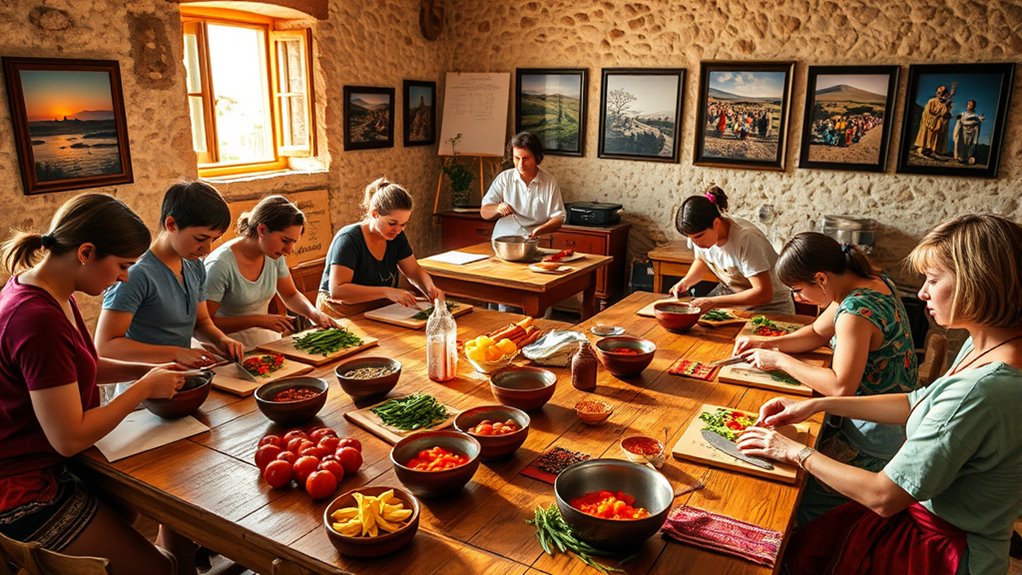
Cultural excursions like farm visits, market tours, and exploring local culinary traditions give you a hands-on understanding of food origins and practices. These experiences connect you directly with producers and vendors, revealing how ingredients are sourced and prepared. By participating, you gain insights that go beyond recipes, enriching your culinary knowledge and cultural appreciation. A rustic decor perspective can also enhance your understanding of traditional food presentation and ambiance. Off-the-beaten-path destinations offer unique opportunities for authentic engagement with local food cultures, deepening your overall culinary education.
Farm Visits and Sourcing
Farm visits play an essential role in culinary education by connecting students directly to the sources of their food. They deepen your understanding of where ingredients come from, fostering appreciation for local agriculture. These excursions promote healthier eating habits by making fruits and vegetables more familiar and appealing. As you pick crops and interact with farmers, you learn about sustainability, environmental impact, and the food’s journey from farm to table. Incorporating food sourcing into curricula supports local economies and encourages responsible consumption. Here’s an overview:
| Benefit | Description | Impact |
|---|---|---|
| Nutrition Knowledge | Connects classroom lessons to real foods | Increased vegetable intake |
| Healthy Eating Habits | Exposure encourages trying fresh produce | Better overall health |
| Food System Understanding | Shows origins and production processes | Appreciation for sustainability |
| Supporting Local Economies | Sourcing from local farms | Strengthens regional agriculture |
| Experiential Learning | Hands-on activities at farms | Reinforces multidisciplinary education |
Farm visits play an essential role in culinary education by connecting students directly to the sources of their food. They deepen your understanding of where ingredients come from, fostering appreciation for local agriculture. These excursions promote healthier eating habits by making fruits and vegetables more familiar and appealing. As you pick crops and interact with farmers, you learn about sustainability, environmental impact, and the food’s journey from farm to table. Understanding how food is produced helps students make informed choices about their diets and encourages a greater respect for the environment. Incorporating farm visits into curricula supports local economies and encourages responsible consumption. Here’s an overview:
| Benefit | Description | Impact |
|---|---|---|
| Nutrition Knowledge | Connects classroom lessons to real foods | Increased vegetable intake |
| Healthy Eating Habits | Exposure encourages trying fresh produce | Better overall health |
| Food System Understanding | Shows origins and production processes | Appreciation for sustainability |
| Supporting Local Economies | Sourcing from local farms | Strengthens regional agriculture |
| Experiential Learning | Hands-on activities at farms | Reinforces multidisciplinary education |
Market Exploration Tours
Market exploration tours serve as immersive experiences that bring culinary students face-to-face with regional ingredients, traditional food practices, and local artisans. You’ll actively participate in selecting fresh produce, observe cooking demonstrations, and learn how ingredients are used in local dishes. These tours deepen your understanding of food history and cultural traditions, providing context that enriches your culinary knowledge. Interacting directly with vendors, artisans, and chefs offers authentic insights into food customs and rituals, strengthening your connection to the region’s culinary heritage. By supporting small producers and local markets, you help sustain traditional livelihoods and promote regional recipes. These tours emphasize seasonal, locally sourced ingredients and sustainable practices, turning sightseeing into a meaningful, educational experience that enhances both your skills and cultural appreciation. Additionally, understanding ethical sourcing principles during these tours ensures the preservation of regional culinary practices and supports responsible food traditions.
Local Culinary Traditions
Participating in cultural excursions during culinary training allows you to connect directly with Ittiri’s rich culinary heritage. You’ll experience local cooking techniques that reflect regional customs and traditions, gaining authentic insights from chefs and home cooks. Engaging with elders and artisans helps preserve recipes and practices, ensuring these traditions are passed down. Visiting farms, historic sites, and food producers deepens your understanding of sustainable farming and regional foodways. Sharing meals with locals during excursions fosters a sense of community and highlights the cultural significance of food in festivals and daily life. These experiences not only teach you traditional methods but also strengthen cultural identity, helping to keep Ittiri’s culinary heritage alive for future generations. Cultural excursions also promote sustainable practices by emphasizing seasonal foods and traditional cooking methods. Moreover, participating in local food markets exposes students to fresh, regional ingredients that are essential in authentic Ittiri cuisine.
Traditional Tools and Methods in Modern Cooking Classes
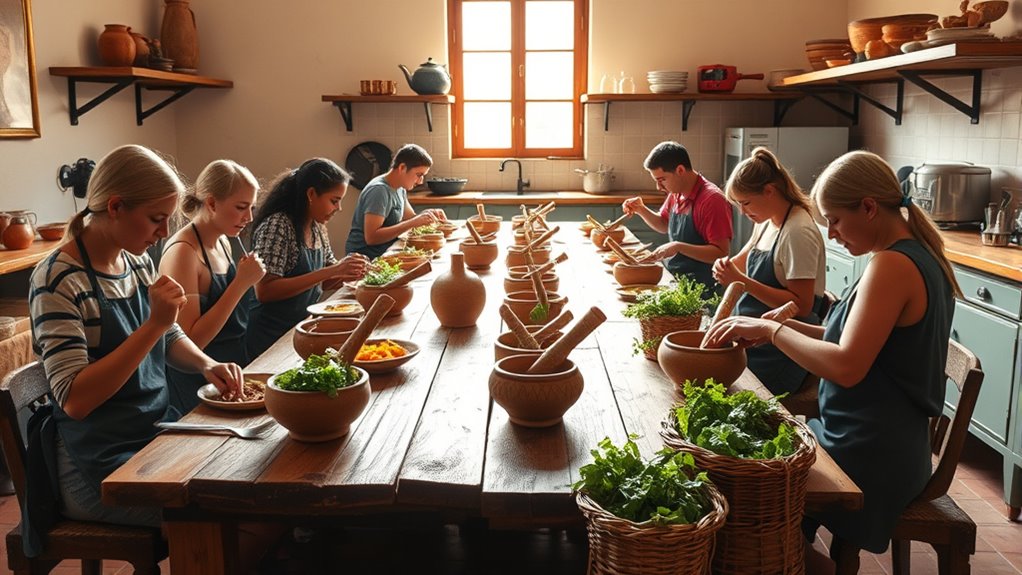
Modern culinary classes in Ittiri integrate traditional tools and methods to preserve Sardinian culinary heritage while offering authentic learning experiences. You’ll work with mortar and pestle, hand-forged knives, and clay ovens to understand the roots of regional cooking. Wood-fired ovens reproduce traditional temperatures and flavors essential for authentic dishes. Handmade pasta rollers and wooden boards teach classic pasta and bread techniques, fostering a tactile connection to ingredients. Using traditional hand tools enhances your understanding of texture and handling, which modern machines can’t replicate. Schools also blend old and new methods, like slow roasting and sous vide, to maintain authenticity and consistency. This approach deepens your appreciation for Sardinian culinary craftsmanship while adapting to contemporary kitchen environments. Modern tools and techniques support culinary experimentation and precise flavor control, allowing students to explore a wider range of textures and presentations. Incorporating automation and innovative technology helps streamline certain processes, making the learning experience more comprehensive without sacrificing tradition.
How Local Ingredients Shape the Learning Experience
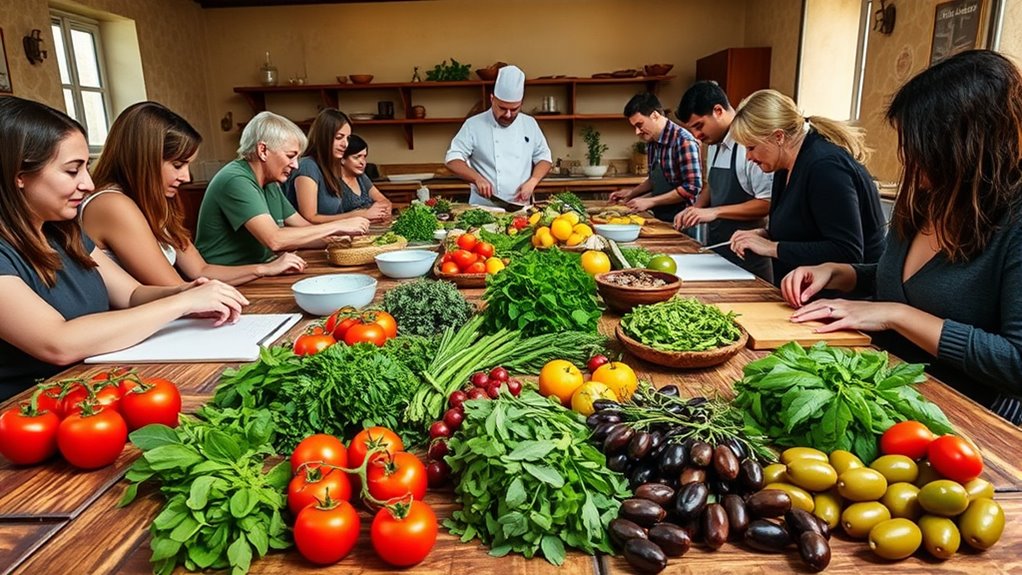
In Ittiri’s culinary schools, the use of local ingredients plays a pivotal role in shaping how students learn and practice traditional Sardinian cooking. You’ll work with indigenous products like porcini mushrooms, olives, lemons, and regional pasta types, which deepen your understanding of local flavors. Traditional dishes, such as sardinian pasta or seafood recipes, are prepared using fresh, locally sourced ingredients, highlighting seasonality and sustainability. You’ll also visit farms, orchards, and markets to harvest ingredients firsthand, connecting classroom learning to real food sources. Understanding where ingredients come from enhances your appreciation for flavor complexity and teaches you to adapt techniques based on ingredient freshness and availability. This focus on regional ingredients ensures authentic, sustainable, and deeply rooted culinary skills. This hands-on approach immerses students more fully in Sardinian culinary traditions and regional ingredient sourcing.
Opportunities for Career Development and Community Engagement
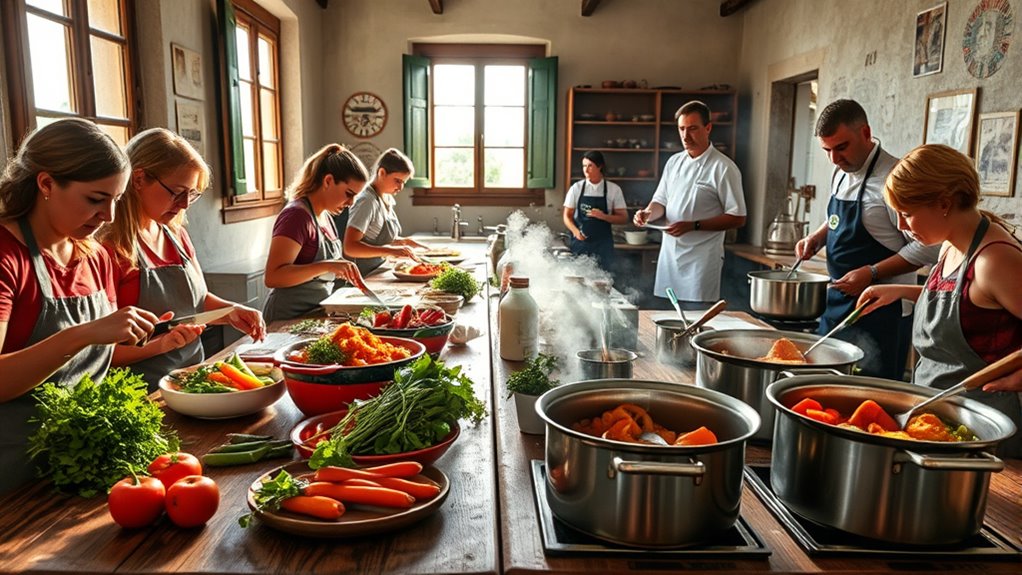
By completing culinary training, you open doors to diverse career paths, from restaurant roles to entrepreneurial ventures like private catering. These opportunities help you grow professionally while also allowing you to connect with and give back to the Ittiri community. Engaging in local food events and collaborations strengthens regional pride and preserves culinary traditions. Many culinary programs also include community service components, fostering a sense of social responsibility and cultural preservation. Developing educational and skill-building toys can further support the growth of aspiring chefs and food enthusiasts in the community.
Enhancing Culinary Careers
Pursuing a culinary career offers numerous opportunities for growth and community engagement that can elevate your professional path. The industry is projected to grow steadily, with job opportunities expanding in traditional roles like chefs and head cooks, especially in regions like Texas, where growth can reach nearly 20%. Expanding sectors such as artisanal food, culinary education, and food media open alternative career paths, positioning you for specialized roles like culinary educator or food stylist. Gaining practical experience through formal training and hands-on work boosts your chances of advancing to higher positions. Networking with instructors and industry contacts can lead to prestigious opportunities. As consumer demand shifts toward healthier, sustainable, and high-quality foods, developing expertise in these areas will further enhance your career prospects and community influence. Regional employment trends also demonstrate that job opportunities in culinary arts are increasing faster than the national average, especially in Texas, which further supports your career growth potential.
Fostering Regional Community
Culinary schools in Ittiri actively strengthen the region’s identity by emphasizing traditional Sardinian cooking techniques and local ingredients. By focusing on regional recipes and culinary customs, they foster a sense of community heritage and preserve cultural traditions for future generations. Community events, cooking demonstrations, and collaborations with local producers engage residents and visitors alike, deepening cultural appreciation. Student-run restaurants and cafes showcase local cuisine, encouraging community interaction and support for emerging chefs. Workshops, tastings, and festivals invite participation, creating opportunities for networking and regional pride. These programs also prepare students for careers within local food businesses through apprenticeships and industry-aligned certifications. Ultimately, they promote regional sustainability, strengthen social bonds, and support the local economy by championing regional specialties and sustainable sourcing. Incorporating business and economy principles, these initiatives also contribute to regional economic development and resilience.
Frequently Asked Questions
Are Courses Suitable for Complete Beginners in Cooking?
Yes, courses are perfect for complete beginners because they focus on fundamental techniques like knife handling, basic recipes, and food safety. You’ll learn step-by-step through hands-on activities and demonstrations, building confidence in your cooking skills. Many programs also offer flexible formats, including online options, so you can start learning without prior experience. By the end, you’ll have a solid foundation to experiment and enjoy cooking Italian dishes confidently.
Can I Participate in Culinary Workshops Without Prior Experience?
Yes, you can participate in culinary workshops without prior experience. Most are designed for beginners, focusing on fundamental skills like safety, knife techniques, and basic cooking methods. They provide step-by-step instructions in a supportive, relaxed environment. You’ll learn by doing, practicing essential techniques repeatedly. Just make sure to gather your supplies beforehand and follow the instructor’s guidance closely. These workshops are perfect for building confidence and developing your cooking skills from scratch.
What Languages Are Classes Conducted In?
Imagine stepping into a lively kitchen, where the aroma of herbs and spices fills the air. In Ittiri’s culinary schools, classes are mainly conducted in Italian, immersing you in Sardinian culinary culture. If you’re an international student, they offer courses in English or provide interpretation. So, whether you speak Italian or not, you’ll find a way to connect with the authentic techniques and recipes that bring Sardinian cuisine to life.
Are There Options for Short-Term or Weekend Courses?
You can find short-term or weekend culinary courses that fit your schedule. These programs focus on practical skills like knife handling, kitchen safety, and traditional recipes, often lasting just a few days or weeks. Many schools offer weekend or evening classes with small groups for personalized instruction. Plus, you can earn certifications like ServSafe or basic cooking certificates, all while gaining hands-on experience in professional kitchen environments.
Do Programs Include Certification or Professional Accreditation?
You’ll find that many culinary programs include certification and professional accreditation. These programs often prepare you for industry-recognized certifications like ServSafe, ensuring your skills meet industry standards. Accredited schools maintain quality education standards, boosting your credibility. Earning these certifications and credentials can help you stand out in the job market, open doors for advanced training, and give you confidence in your culinary expertise, setting a strong foundation for your career.
Conclusion
At ittiri’s culinary school, you’re not just learning recipes—you’re weaving yourself into Sardinia’s vibrant culinary tapestry. Each hands-on lesson and cultural excursion adds a colorful thread, creating a rich, authentic experience. As you master traditional tools and local ingredients, you become a skilled artisan shaping a timeless craft. Immerse yourself, and let this journey be the compass guiding you through Sardinian flavors, transforming your passion into a masterpiece.
